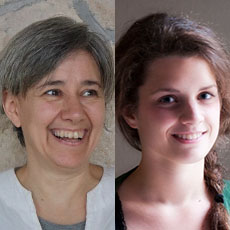Ungarischer Aphasie-Chor bewältigt die COVID-19-Pandemie online
DOI:
https://doi.org/10.15845/voices.v22i1.3337Schlagworte:
Aphasie-Chor, Community Musiktherapie, Singen, Online, PandemieAbstract
Aphasie-Chöre haben in den letzten zehn Jahren immer mehr Aufmerksamkeit erregt. Deren Tätigkeit beruht auf zwei Säulen: der therapeutischen Wirkung des Singens bei Aphasie und der Verringerung der sozialen Isolation von Klient*innen mit einer verbalen Sprachstörung. Ziel dieses Artikels ist es, die Aufmerksamkeit auf die internationale Gemeinschaft dieser Chöre zu lenken, mit besonderem Augenmerk auf den ungarischen Aphasie-Chor, und ihre Herausforderungen aufzuzeigen, die sich aus den Einschränkungen ergeben, die durch die SARS-CoV-2-Pandemie entstanden sind. Der ungarische Aphasie-Chor hat seine therapeutischen Proben seit sieben Monaten online durchgeführt. Die Erfahrungen der Teilnehmenden und ihre Bewältigungsmethoden in Bezug auf die Online- und Offline-Chorproben, wurden anhand einer Online-Umfrage mit fünf Fragen untersucht. Die Umfrage wurde von dreizehn Chormitgliedern, die mit Aphasie leben, sowie von einigen ihrer Betreuenden ausgefüllt. Die Antworten zeigen deutlich den allgemeinen Wunsch der Chormitglieder, die Offline-Proben fortzusetzen, während die Ergebnisse auch zeigen, dass die Online-Proben die soziale Isolation wirksam verringern können.
Literaturhinweise
Ansdell, G. (2002). Community music therapy and the winds of change. Voices: A World Forum for Music Therapy, 2(2 SE-Essays). https://doi.org/10.15845/voices.v2i2.83
Fogg, L., & Talmage, A. (2011). The CeleBRation Choir: Establishing community group choral singing for people living with neurological conditions. Psychomusicology: Music, Mind and Brain, 21(1–2), 264–267. https://doi.org/10.1037/h0094030
Jones, B., Bernstein-Ellis, E., Mahendra, N., & Rose, M. (2013). Aphasia Choirs go global: An international survey comparing structure, goals and outcome measures. Poster. ASHA Annual Convention. http://works.bepress.com/nidhi-mahendra/97/
Leonardi, S., Cacciola, A., De Luca, R., Aragona, B., Andronaco, V., Milardi, D., Bramanti, P., & Calabrò, R. S. (2018). The role of music therapy in rehabilitation: Improving aphasia and beyond. International Journal of Neuroscience, 128(1), 90–99. https://doi.org/10.1080/00207454.2017.1353981
Mantie-Kozlowski, A., Mantie, R., & Keller, C. H. (2018). Enjoyment in a recreational sing-along group for people with aphasia and their caregivers. Aphasiology, 32(5), 518–537. https://doi.org/10.1080/02687038.2018.1427208
Monroe, P., Halaki, M., Kumfor, F., & Ballard, K. J. (2020). The effects of choral singing on communication impairments in acquired brain injury: A systematic review. International Journal of Language and Communication Disorders, 55(3), 303–319. https://doi.org/10.1111/1460-6984.12527
Pike, C., Kritzinger, A., & Pillay, B. (2017). Social participation in working-age adults with aphasia: An updated systematic review. Topics in Stroke Rehabilitation, 24(8), 627–639. https://doi.org/10.1080/10749357.2017.1366012
Procter, S. (2001). Empowering and Enabling. Voices: A World Forum for Music Therapy, 1(2 SE-Essays). https://doi.org/10.15845/voices.v1i2.58
Schlaug, G. (2015). Melodic Intonation Therapy. In G. Hickok, S. L. Small (Ed.), Neurobiology of Language (pp. 1015–1023). Elsevier Inc. https://doi.org/10.1016/B978-0-12-407794-2.00081-X
Schlaug, G., Norton, A., Marchina, S., Lauryn, Z., & Wan, C. Y. (2010). From singing to speaking: Facilitating recovery from nonfluent aphasia. Future Neurology, 5(5), 657–665. https://doi.org/10.2217/fnl.10.44
Shadden, B. B. (2005). Aphasia as identity theft: Theory and practice. Aphasiology, 19(3–5), 211–223. https://doi.org/10.1080/02687930444000697
Sparks, R., Helm, N., & Albert, M. (1974). Aphasia rehabilitation resulting from melodic intonation therapy. Cortex, 10(4), 303–316. https://doi.org/10.1016/S0010-9452(74)80024-9
Steele, M. (2016). How can music build community? Insight from theories and practice of community music therapy. Voices: A World Forum for Music Therapy, 16(2 SE-Position Papers). https://doi.org/10.15845/voices.v16i2.876
Stige, B., & Aarø, L. E. (2011). Invitation to Community Music Therapy. Routledge. https://doi.org/10.4324/9780203803547
Tamplin, J., Baker, F. A., Jones, B., Way, A., & Lee, S. (2013). “Stroke a chord”: The effect of singing in a community choir on mood and social engagement for people living with aphasia following a stroke. NeuroRehabilitation, 32(4), 929–941. https://doi.org/10.3233/NRE-130916
Tarrant, M., Carter, M., Dean, S. G., Taylor, R., Warren, F. C., Spencer, A., Adamson, J., Landa, P., Code, C., Backhouse, A., Lamont, R. A., & Calitri, R. (2021). Singing for people with aphasia (SPA): Results of a pilot feasibility randomised controlled trial of a group singing intervention investigating acceptability and feasibility. BMJ Open, 11(1), 1–12. https://doi.org/10.1136/bmjopen-2020-040544
Tarrant, M., Warmoth, K., Code, C., Dean, S., Goodwin, V. A., Stein, K., & Sugavanam, T. (2016). Creating psychological connections between intervention recipients: Development and focus group evaluation of a group singing session for people with aphasia. BMJ Open, 6(2), 1–9. https://doi.org/10.1136/bmjopen-2015-009652
Tiszai, L., & Szűcs-Ittzés, Z. (2016). Community music therapy projects between musicians living with severe disabilities and adolescent music students. Nordic Journal of Music Therapy, 25(sup1), 152–153. https://doi.org/10.1080/08098131.2016.1180203
Tomaino, C. M. (2012). Effective music therapy techniques in the treatment of nonfluent aphasia. Annals of the New York Academy of Sciences, 1252, 312–317. https://doi.org/10.1111/j.1749-6632.2012.06451.x
Yamaguchi, S., Akanuma, K., Hatayama, Y., Otera, M., & Meguro, K. (2012). Singing therapy can be effective for a patient with severe nonfluent aphasia. International Journal of Rehabilitation Research, 35(1), 78–81. https://doi.org/10.1097/MRR.0b013e32835032f8
Zumbansen, A., Peretz, I., Anglade, C., Bilodeau, J., Généreux, S., Hubert, M., & Hébert, S. (2017). Effect of choir activity in the rehabilitation of aphasia: A blind, randomised, controlled pilot study. Aphasiology, 31(8), 879–900. https://doi.org/10.1080/02687038.2016.1227424

Downloads
Veröffentlicht
Zitationsvorschlag
Ausgabe
Rubrik
Lizenz
Copyright (c) 2022 Zsófia Fekete, Fanni Eckhardt, MS

Dieses Werk steht unter der Lizenz Creative Commons Namensnennung 4.0 International.
Articles published prior to 2019 are subject to the following license, see: https://voices.no/index.php/voices/copyright

